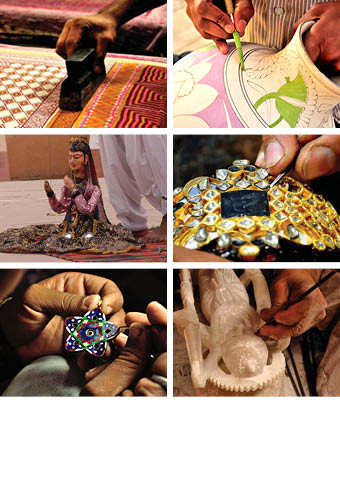
Project Scope: To prepare the dossier for Jaipur as ‘City of Crafts’ to join the UNESCO Network of Creative Cities.
Project Brief: The city of Jaipur represents the continuity of a tradition of creativity, which has evolved over centuries and continues to be an integral part of its living heritage. Since its foundation in 1727 by Sawai Jai Singh II, it has become an exemplar of city planning globally. Its urban form and architectural identity respond sensitively to the physical and cultural context of Rajasthan.
Located on important trade routes, Jaipur has been an important and vibrant centre for trade and commerce. It has become the home of large numbers of artisans, craftsmen and merchants from distant parts of India. There are potters, utensil makers, stone carvers, building craftsmen and builders, leather workers and tanners, jewellers, ivory carvers, brass ware s, enamellers; weavers, dyers and embroiderers, settled in neighbourhoods occupied by families pursuing similar trade or craft. The same guild system continues till date. The royal patronage to literary works, music, miniature painting and the performing arts has led to the evolution of the Jaipur style of painting, music and dance and the encouragement of the Dhoondhari language.
As part of the UNESCO Creative Cities Network, Jaipur can showcase its rich and vibrant creative heritage on a global platform and foster meaningful dialogues with Creative Cities. The Network is an opportunity for Jaipur to encourage innovation and build local capacity and access a wide range of creative resources and knowledge. Jaipur is a melting pot of creative traditions and can make a significant contribution to the Creative Cities Network by sharing its wide ranging skills and experiences.